SCU CMM91010 Professional Portfolio: Biography & Reflection
VerifiedAdded on 2023/01/18
|6
|1748
|24
Project
AI Summary
This assignment presents a healthcare professional portfolio created by a student at Southern Cross University (SCU), fulfilling the requirements of the CMM91010 course. The portfolio includes a detailed biography, outlining the student's background, values, and motivations for pursuing a career in mental health nursing. It also features critical analyses of their nursing practice, leadership skills, and professional standards, with a focus on collaborative working, communication, and professionalism. The student reflects on key learning experiences and demonstrates an understanding of ethical responsibilities, incorporating relevant literature and personal experiences to illustrate their professional development. The portfolio highlights the student's short-term and long-term career goals, emphasizing their commitment to continuous improvement and patient-centered care, adhering to all federal and state regulations and hospital policies. The document showcases the student's ability to integrate theoretical knowledge with practical application, demonstrating a deep understanding of the healthcare profession.
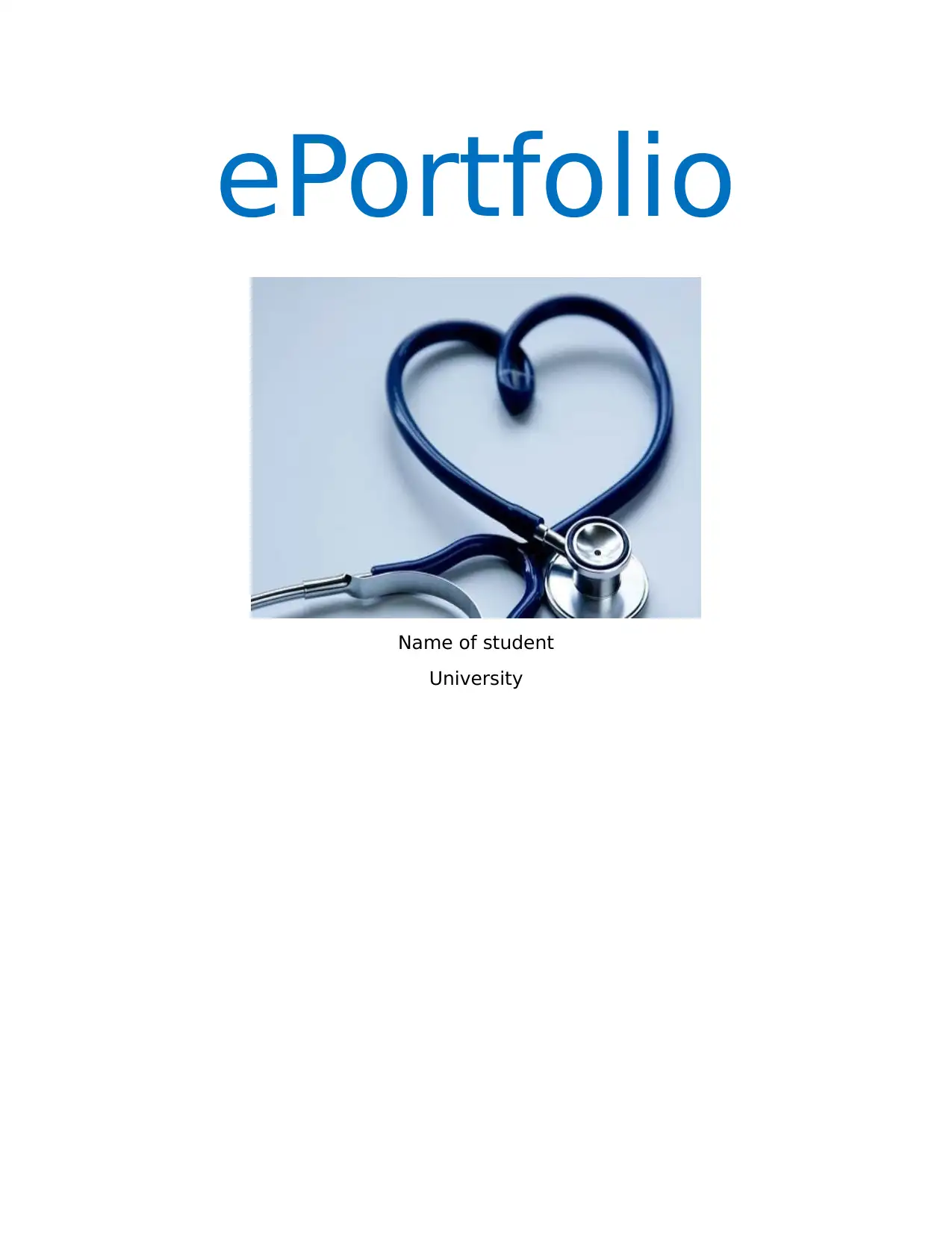
ePortfolio
Name of student
University
Name of student
University
Paraphrase This Document
Need a fresh take? Get an instant paraphrase of this document with our AI Paraphraser
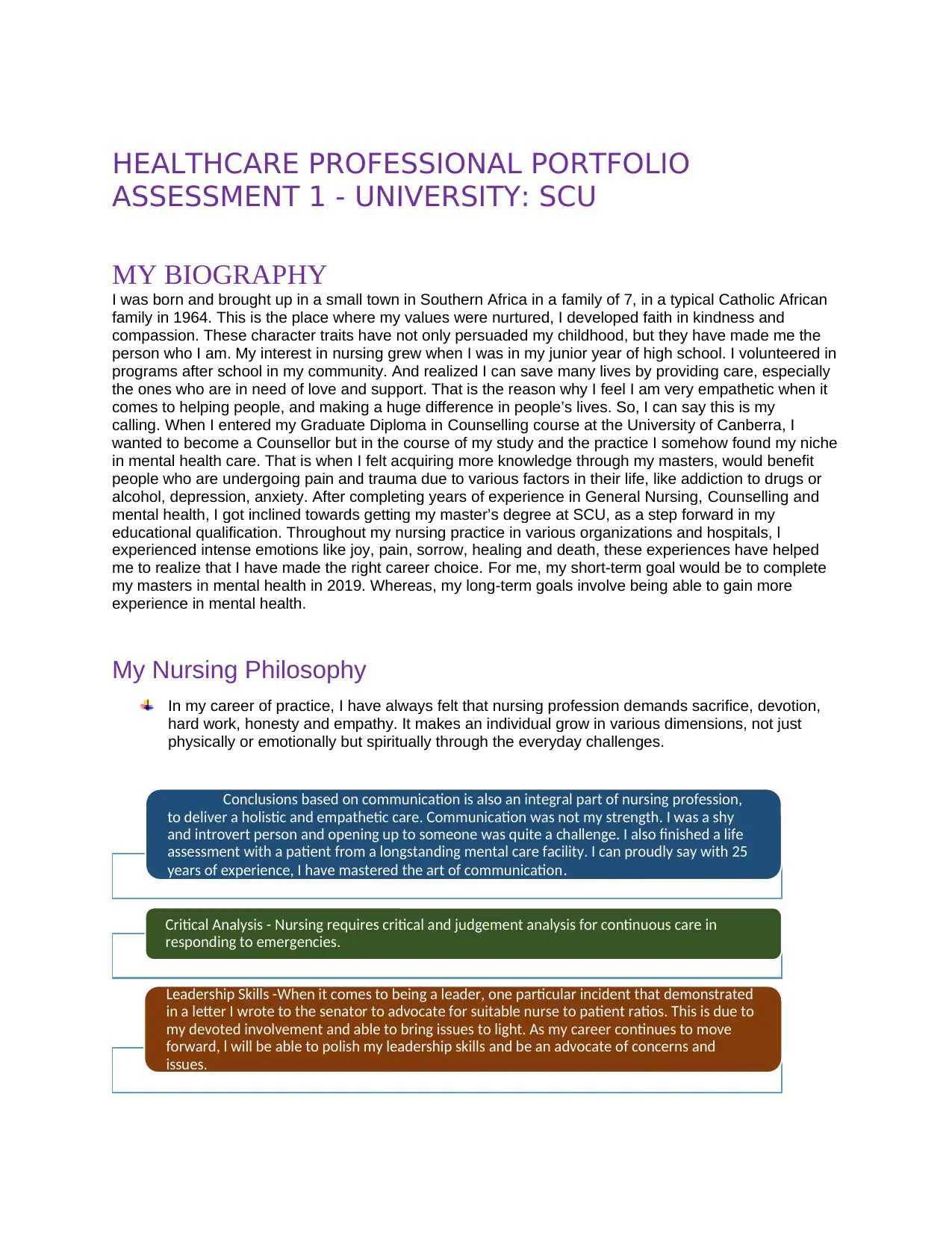
HEALTHCARE PROFESSIONAL PORTFOLIO
ASSESSMENT 1 - UNIVERSITY: SCU
MY BIOGRAPHY
I was born and brought up in a small town in Southern Africa in a family of 7, in a typical Catholic African
family in 1964. This is the place where my values were nurtured, I developed faith in kindness and
compassion. These character traits have not only persuaded my childhood, but they have made me the
person who I am. My interest in nursing grew when I was in my junior year of high school. I volunteered in
programs after school in my community. And realized I can save many lives by providing care, especially
the ones who are in need of love and support. That is the reason why I feel I am very empathetic when it
comes to helping people, and making a huge difference in people’s lives. So, I can say this is my
calling. When I entered my Graduate Diploma in Counselling course at the University of Canberra, I
wanted to become a Counsellor but in the course of my study and the practice I somehow found my niche
in mental health care. That is when I felt acquiring more knowledge through my masters, would benefit
people who are undergoing pain and trauma due to various factors in their life, like addiction to drugs or
alcohol, depression, anxiety. After completing years of experience in General Nursing, Counselling and
mental health, I got inclined towards getting my master’s degree at SCU, as a step forward in my
educational qualification. Throughout my nursing practice in various organizations and hospitals, l
experienced intense emotions like joy, pain, sorrow, healing and death, these experiences have helped
me to realize that I have made the right career choice. For me, my short-term goal would be to complete
my masters in mental health in 2019. Whereas, my long-term goals involve being able to gain more
experience in mental health.
My Nursing Philosophy
In my career of practice, I have always felt that nursing profession demands sacrifice, devotion,
hard work, honesty and empathy. It makes an individual grow in various dimensions, not just
physically or emotionally but spiritually through the everyday challenges.
Conclusions based on communication is also an integral part of nursing profession,
to deliver a holistic and empathetic care. Communication was not my strength. I was a shy
and introvert person and opening up to someone was quite a challenge. I also finished a life
assessment with a patient from a longstanding mental care facility. I can proudly say with 25
years of experience, I have mastered the art of communication .
Critical Analysis - Nursing requires critical and judgement analysis for continuous care in
responding to emergencies.
Leadership Skills -When it comes to being a leader, one particular incident that demonstrated
in a letter I wrote to the senator to advocate for suitable nurse to patient ratios. This is due to
my devoted involvement and able to bring issues to light. As my career continues to move
forward, l will be able to polish my leadership skills and be an advocate of concerns and
issues.
ASSESSMENT 1 - UNIVERSITY: SCU
MY BIOGRAPHY
I was born and brought up in a small town in Southern Africa in a family of 7, in a typical Catholic African
family in 1964. This is the place where my values were nurtured, I developed faith in kindness and
compassion. These character traits have not only persuaded my childhood, but they have made me the
person who I am. My interest in nursing grew when I was in my junior year of high school. I volunteered in
programs after school in my community. And realized I can save many lives by providing care, especially
the ones who are in need of love and support. That is the reason why I feel I am very empathetic when it
comes to helping people, and making a huge difference in people’s lives. So, I can say this is my
calling. When I entered my Graduate Diploma in Counselling course at the University of Canberra, I
wanted to become a Counsellor but in the course of my study and the practice I somehow found my niche
in mental health care. That is when I felt acquiring more knowledge through my masters, would benefit
people who are undergoing pain and trauma due to various factors in their life, like addiction to drugs or
alcohol, depression, anxiety. After completing years of experience in General Nursing, Counselling and
mental health, I got inclined towards getting my master’s degree at SCU, as a step forward in my
educational qualification. Throughout my nursing practice in various organizations and hospitals, l
experienced intense emotions like joy, pain, sorrow, healing and death, these experiences have helped
me to realize that I have made the right career choice. For me, my short-term goal would be to complete
my masters in mental health in 2019. Whereas, my long-term goals involve being able to gain more
experience in mental health.
My Nursing Philosophy
In my career of practice, I have always felt that nursing profession demands sacrifice, devotion,
hard work, honesty and empathy. It makes an individual grow in various dimensions, not just
physically or emotionally but spiritually through the everyday challenges.
Conclusions based on communication is also an integral part of nursing profession,
to deliver a holistic and empathetic care. Communication was not my strength. I was a shy
and introvert person and opening up to someone was quite a challenge. I also finished a life
assessment with a patient from a longstanding mental care facility. I can proudly say with 25
years of experience, I have mastered the art of communication .
Critical Analysis - Nursing requires critical and judgement analysis for continuous care in
responding to emergencies.
Leadership Skills -When it comes to being a leader, one particular incident that demonstrated
in a letter I wrote to the senator to advocate for suitable nurse to patient ratios. This is due to
my devoted involvement and able to bring issues to light. As my career continues to move
forward, l will be able to polish my leadership skills and be an advocate of concerns and
issues.
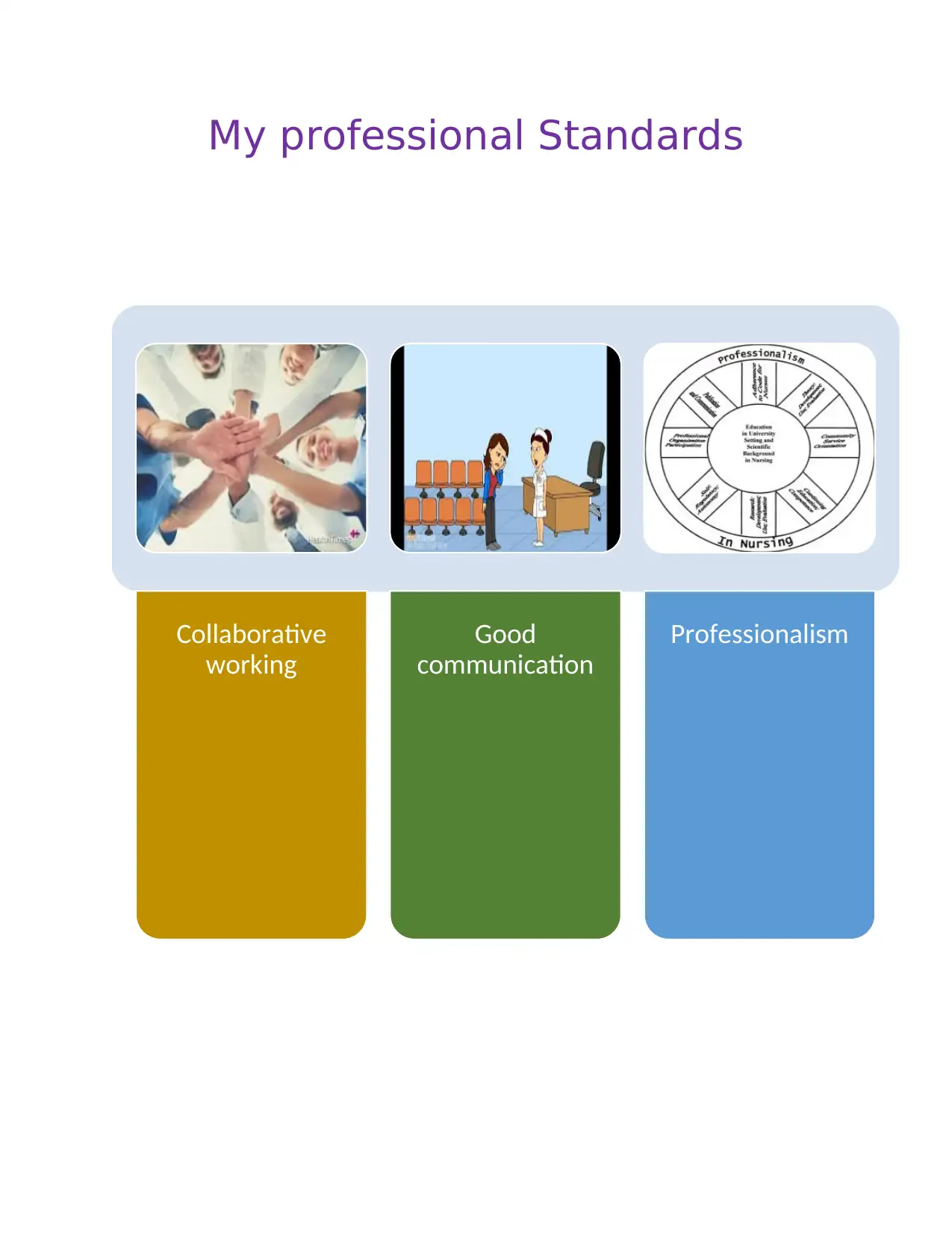
My professional Standards
Collaborative
working
Good
communication
Professionalism
Collaborative
working
Good
communication
Professionalism
⊘ This is a preview!⊘
Do you want full access?
Subscribe today to unlock all pages.

Trusted by 1+ million students worldwide
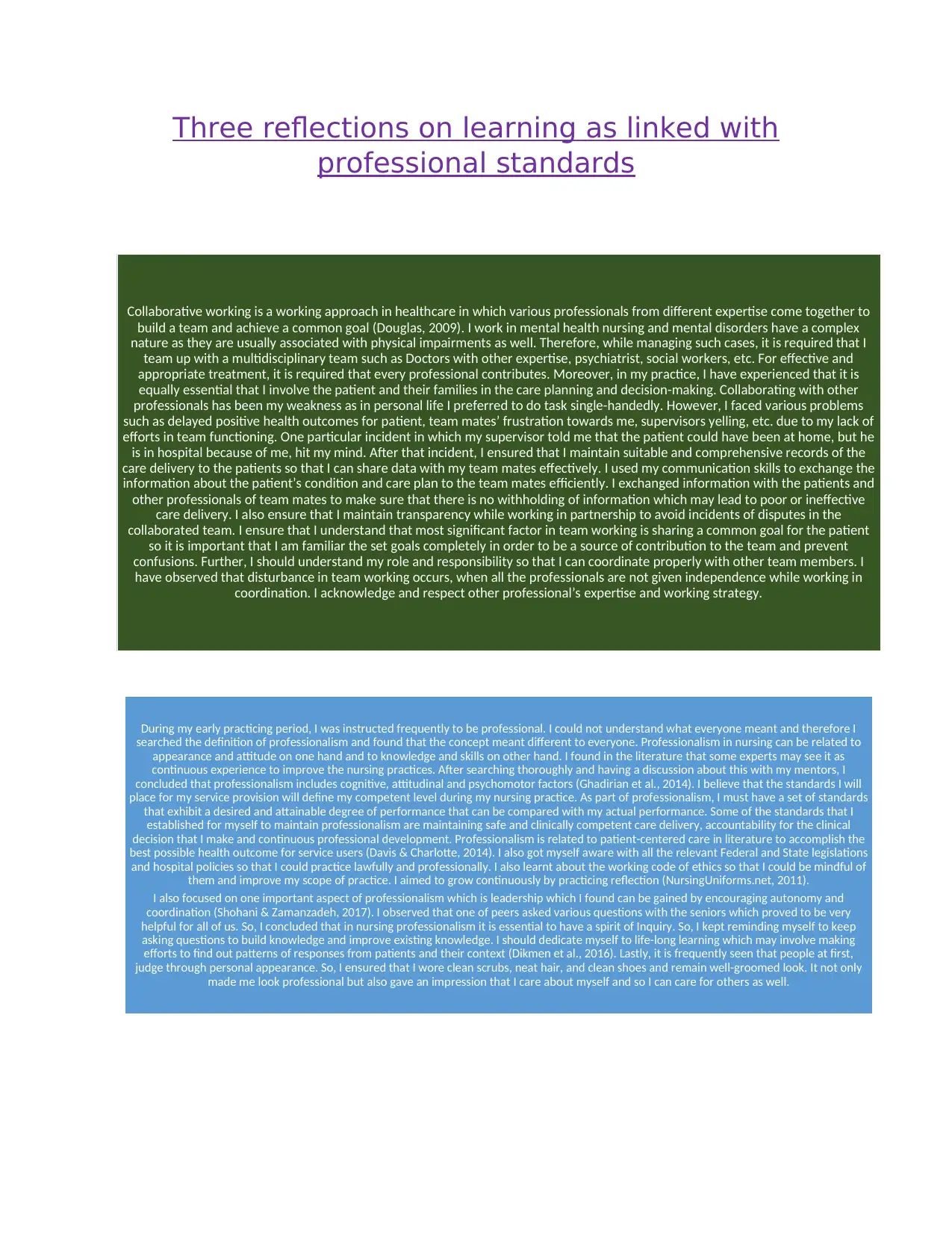
Three reflections on learning as linked with
professional standards
Collaborative working is a working approach in healthcare in which various professionals from different expertise come together to
build a team and achieve a common goal (Douglas, 2009). I work in mental health nursing and mental disorders have a complex
nature as they are usually associated with physical impairments as well. Therefore, while managing such cases, it is required that I
team up with a multidisciplinary team such as Doctors with other expertise, psychiatrist, social workers, etc. For effective and
appropriate treatment, it is required that every professional contributes. Moreover, in my practice, I have experienced that it is
equally essential that I involve the patient and their families in the care planning and decision-making. Collaborating with other
professionals has been my weakness as in personal life I preferred to do task single-handedly. However, I faced various problems
such as delayed positive health outcomes for patient, team mates’ frustration towards me, supervisors yelling, etc. due to my lack of
efforts in team functioning. One particular incident in which my supervisor told me that the patient could have been at home, but he
is in hospital because of me, hit my mind. After that incident, I ensured that I maintain suitable and comprehensive records of the
care delivery to the patients so that I can share data with my team mates effectively. I used my communication skills to exchange the
information about the patient’s condition and care plan to the team mates efficiently. I exchanged information with the patients and
other professionals of team mates to make sure that there is no withholding of information which may lead to poor or ineffective
care delivery. I also ensure that I maintain transparency while working in partnership to avoid incidents of disputes in the
collaborated team. I ensure that I understand that most significant factor in team working is sharing a common goal for the patient
so it is important that I am familiar the set goals completely in order to be a source of contribution to the team and prevent
confusions. Further, I should understand my role and responsibility so that I can coordinate properly with other team members. I
have observed that disturbance in team working occurs, when all the professionals are not given independence while working in
coordination. I acknowledge and respect other professional’s expertise and working strategy.
During my early practicing period, I was instructed frequently to be professional. I could not understand what everyone meant and therefore I
searched the definition of professionalism and found that the concept meant different to everyone. Professionalism in nursing can be related to
appearance and attitude on one hand and to knowledge and skills on other hand. I found in the literature that some experts may see it as
continuous experience to improve the nursing practices. After searching thoroughly and having a discussion about this with my mentors, I
concluded that professionalism includes cognitive, attitudinal and psychomotor factors (Ghadirian et al., 2014). I believe that the standards I will
place for my service provision will define my competent level during my nursing practice. As part of professionalism, I must have a set of standards
that exhibit a desired and attainable degree of performance that can be compared with my actual performance. Some of the standards that I
established for myself to maintain professionalism are maintaining safe and clinically competent care delivery, accountability for the clinical
decision that I make and continuous professional development. Professionalism is related to patient-centered care in literature to accomplish the
best possible health outcome for service users (Davis & Charlotte, 2014). I also got myself aware with all the relevant Federal and State legislations
and hospital policies so that I could practice lawfully and professionally. I also learnt about the working code of ethics so that I could be mindful of
them and improve my scope of practice. I aimed to grow continuously by practicing reflection (NursingUniforms.net, 2011).
I also focused on one important aspect of professionalism which is leadership which I found can be gained by encouraging autonomy and
coordination (Shohani & Zamanzadeh, 2017). I observed that one of peers asked various questions with the seniors which proved to be very
helpful for all of us. So, I concluded that in nursing professionalism it is essential to have a spirit of Inquiry. So, I kept reminding myself to keep
asking questions to build knowledge and improve existing knowledge. I should dedicate myself to life-long learning which may involve making
efforts to find out patterns of responses from patients and their context (Dikmen et al., 2016). Lastly, it is frequently seen that people at first,
judge through personal appearance. So, I ensured that I wore clean scrubs, neat hair, and clean shoes and remain well-groomed look. It not only
made me look professional but also gave an impression that I care about myself and so I can care for others as well.
professional standards
Collaborative working is a working approach in healthcare in which various professionals from different expertise come together to
build a team and achieve a common goal (Douglas, 2009). I work in mental health nursing and mental disorders have a complex
nature as they are usually associated with physical impairments as well. Therefore, while managing such cases, it is required that I
team up with a multidisciplinary team such as Doctors with other expertise, psychiatrist, social workers, etc. For effective and
appropriate treatment, it is required that every professional contributes. Moreover, in my practice, I have experienced that it is
equally essential that I involve the patient and their families in the care planning and decision-making. Collaborating with other
professionals has been my weakness as in personal life I preferred to do task single-handedly. However, I faced various problems
such as delayed positive health outcomes for patient, team mates’ frustration towards me, supervisors yelling, etc. due to my lack of
efforts in team functioning. One particular incident in which my supervisor told me that the patient could have been at home, but he
is in hospital because of me, hit my mind. After that incident, I ensured that I maintain suitable and comprehensive records of the
care delivery to the patients so that I can share data with my team mates effectively. I used my communication skills to exchange the
information about the patient’s condition and care plan to the team mates efficiently. I exchanged information with the patients and
other professionals of team mates to make sure that there is no withholding of information which may lead to poor or ineffective
care delivery. I also ensure that I maintain transparency while working in partnership to avoid incidents of disputes in the
collaborated team. I ensure that I understand that most significant factor in team working is sharing a common goal for the patient
so it is important that I am familiar the set goals completely in order to be a source of contribution to the team and prevent
confusions. Further, I should understand my role and responsibility so that I can coordinate properly with other team members. I
have observed that disturbance in team working occurs, when all the professionals are not given independence while working in
coordination. I acknowledge and respect other professional’s expertise and working strategy.
During my early practicing period, I was instructed frequently to be professional. I could not understand what everyone meant and therefore I
searched the definition of professionalism and found that the concept meant different to everyone. Professionalism in nursing can be related to
appearance and attitude on one hand and to knowledge and skills on other hand. I found in the literature that some experts may see it as
continuous experience to improve the nursing practices. After searching thoroughly and having a discussion about this with my mentors, I
concluded that professionalism includes cognitive, attitudinal and psychomotor factors (Ghadirian et al., 2014). I believe that the standards I will
place for my service provision will define my competent level during my nursing practice. As part of professionalism, I must have a set of standards
that exhibit a desired and attainable degree of performance that can be compared with my actual performance. Some of the standards that I
established for myself to maintain professionalism are maintaining safe and clinically competent care delivery, accountability for the clinical
decision that I make and continuous professional development. Professionalism is related to patient-centered care in literature to accomplish the
best possible health outcome for service users (Davis & Charlotte, 2014). I also got myself aware with all the relevant Federal and State legislations
and hospital policies so that I could practice lawfully and professionally. I also learnt about the working code of ethics so that I could be mindful of
them and improve my scope of practice. I aimed to grow continuously by practicing reflection (NursingUniforms.net, 2011).
I also focused on one important aspect of professionalism which is leadership which I found can be gained by encouraging autonomy and
coordination (Shohani & Zamanzadeh, 2017). I observed that one of peers asked various questions with the seniors which proved to be very
helpful for all of us. So, I concluded that in nursing professionalism it is essential to have a spirit of Inquiry. So, I kept reminding myself to keep
asking questions to build knowledge and improve existing knowledge. I should dedicate myself to life-long learning which may involve making
efforts to find out patterns of responses from patients and their context (Dikmen et al., 2016). Lastly, it is frequently seen that people at first,
judge through personal appearance. So, I ensured that I wore clean scrubs, neat hair, and clean shoes and remain well-groomed look. It not only
made me look professional but also gave an impression that I care about myself and so I can care for others as well.
Paraphrase This Document
Need a fresh take? Get an instant paraphrase of this document with our AI Paraphraser
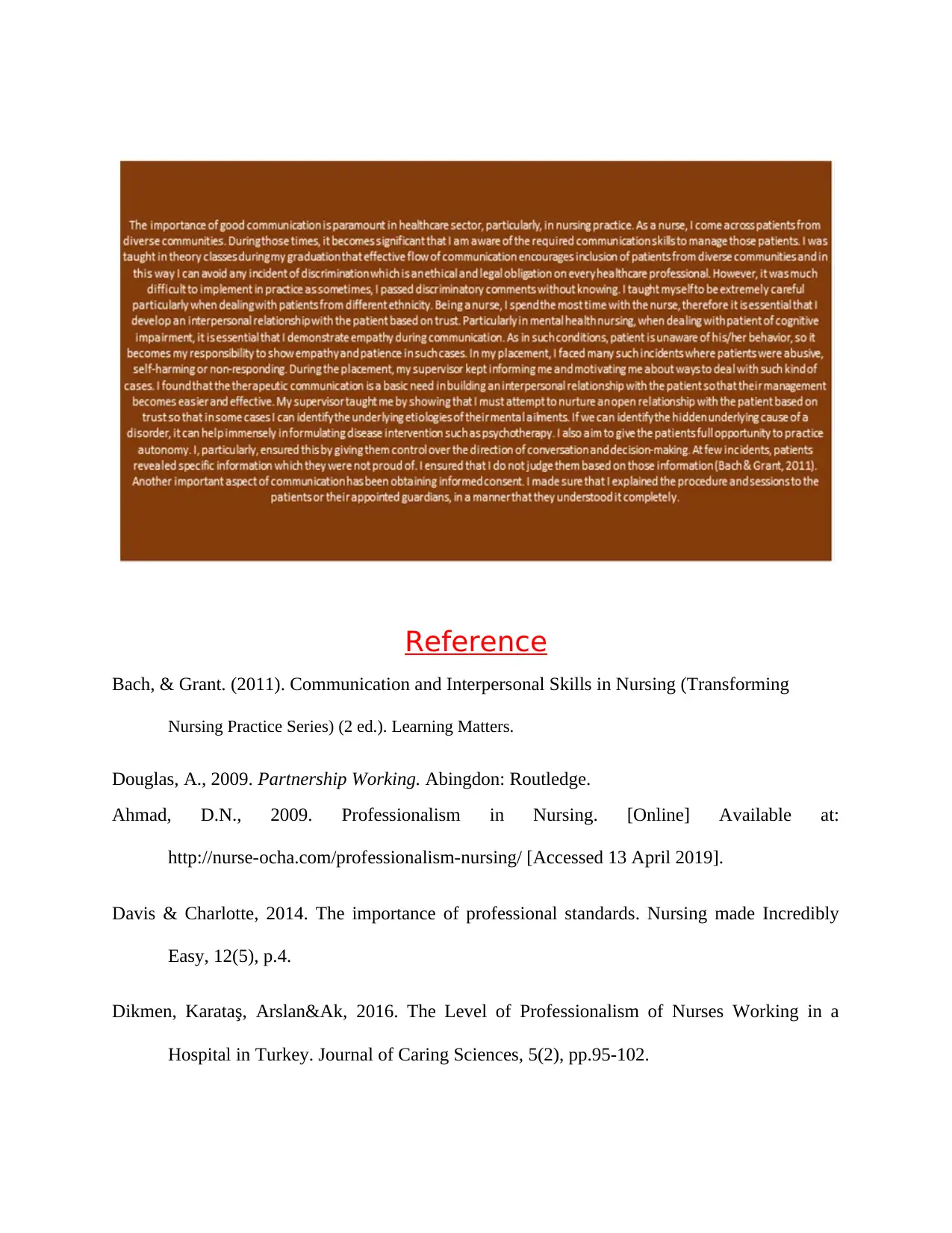
Reference
Bach, & Grant. (2011). Communication and Interpersonal Skills in Nursing (Transforming
Nursing Practice Series) (2 ed.). Learning Matters.
Douglas, A., 2009. Partnership Working. Abingdon: Routledge.
Ahmad, D.N., 2009. Professionalism in Nursing. [Online] Available at:
http://nurse-ocha.com/professionalism-nursing/ [Accessed 13 April 2019].
Davis & Charlotte, 2014. The importance of professional standards. Nursing made Incredibly
Easy, 12(5), p.4.
Dikmen, Karataş, Arslan&Ak, 2016. The Level of Professionalism of Nurses Working in a
Hospital in Turkey. Journal of Caring Sciences, 5(2), pp.95-102.
Bach, & Grant. (2011). Communication and Interpersonal Skills in Nursing (Transforming
Nursing Practice Series) (2 ed.). Learning Matters.
Douglas, A., 2009. Partnership Working. Abingdon: Routledge.
Ahmad, D.N., 2009. Professionalism in Nursing. [Online] Available at:
http://nurse-ocha.com/professionalism-nursing/ [Accessed 13 April 2019].
Davis & Charlotte, 2014. The importance of professional standards. Nursing made Incredibly
Easy, 12(5), p.4.
Dikmen, Karataş, Arslan&Ak, 2016. The Level of Professionalism of Nurses Working in a
Hospital in Turkey. Journal of Caring Sciences, 5(2), pp.95-102.
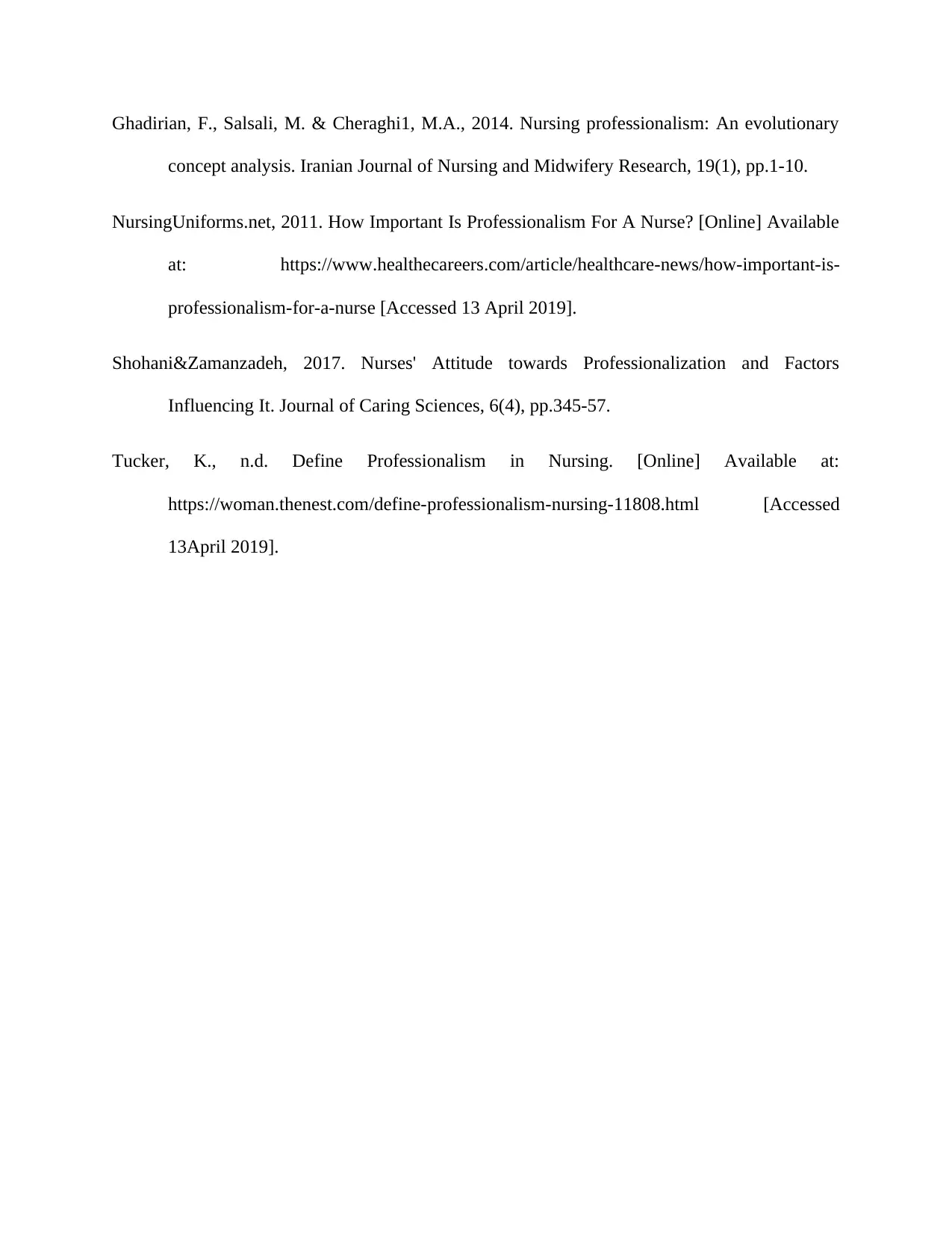
Ghadirian, F., Salsali, M. & Cheraghi1, M.A., 2014. Nursing professionalism: An evolutionary
concept analysis. Iranian Journal of Nursing and Midwifery Research, 19(1), pp.1-10.
NursingUniforms.net, 2011. How Important Is Professionalism For A Nurse? [Online] Available
at: https://www.healthecareers.com/article/healthcare-news/how-important-is-
professionalism-for-a-nurse [Accessed 13 April 2019].
Shohani&Zamanzadeh, 2017. Nurses' Attitude towards Professionalization and Factors
Influencing It. Journal of Caring Sciences, 6(4), pp.345-57.
Tucker, K., n.d. Define Professionalism in Nursing. [Online] Available at:
https://woman.thenest.com/define-professionalism-nursing-11808.html [Accessed
13April 2019].
concept analysis. Iranian Journal of Nursing and Midwifery Research, 19(1), pp.1-10.
NursingUniforms.net, 2011. How Important Is Professionalism For A Nurse? [Online] Available
at: https://www.healthecareers.com/article/healthcare-news/how-important-is-
professionalism-for-a-nurse [Accessed 13 April 2019].
Shohani&Zamanzadeh, 2017. Nurses' Attitude towards Professionalization and Factors
Influencing It. Journal of Caring Sciences, 6(4), pp.345-57.
Tucker, K., n.d. Define Professionalism in Nursing. [Online] Available at:
https://woman.thenest.com/define-professionalism-nursing-11808.html [Accessed
13April 2019].
⊘ This is a preview!⊘
Do you want full access?
Subscribe today to unlock all pages.

Trusted by 1+ million students worldwide
1 out of 6
Related Documents
Your All-in-One AI-Powered Toolkit for Academic Success.
+13062052269
info@desklib.com
Available 24*7 on WhatsApp / Email
![[object Object]](/_next/static/media/star-bottom.7253800d.svg)
Unlock your academic potential
Copyright © 2020–2025 A2Z Services. All Rights Reserved. Developed and managed by ZUCOL.





